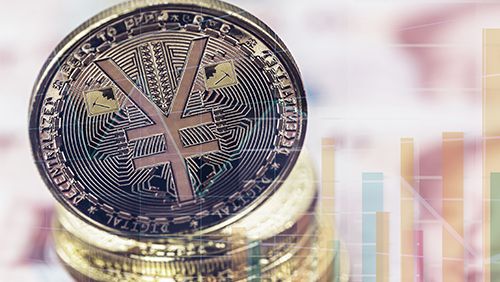
UPDATE: The DICJ issued a statement on Wednesday denying having discussions with casino operators regarding use of the digital yuan, calling the Bloomberg story “a false report.” The original article continues below.
Macau’s gambling regulator, the Gaming Inspection and Coordination Bureau (DICJ, for its Portuguese acronym), might be considering a revolutionary step forward for the city’s gaming industry. Bloomberg has gotten word from several casino operators in Macau that have been contacted by the DICJ to pursue the possibility of introducing China’s upcoming cryptocurrency, the digital yuan, to the gaming space and making it the city’s base currency. So far, the idea is being met with mixed results.
China officially made its digital yuan legal tender when it updated the country’s financial laws at the end of October. It has already begun testing the feasibility of real-world use of the central bank digital currency (CBDC), and has been running pilot programs in areas like Shenzhen and Suzhou. Shenzhen is located in the Guangdong province, which is an important access point for travelers to Macau and Hong Kong. Suzhou is close to Shanghai and is a major economic hub in the country.
It isn’t clear how any digital yuan program would work in Macau. There are reports that the DICJ doesn’t want to allow certain digital wallets to be accepted for use on casino gaming floors, but there would have to be some type of wallet permitted. More than likely, only a state-issued, registered wallet would be allowed.
Macau runs off Hong Kong dollars, for the most part, and introducing the digital yuan would give Chinese high rollers the ability to avoid having to convert their Chinese currency to the alternative. This could potentially reduce the number of currency conversion scams in the city and make it safer for gamblers, who could avoid carrying large amounts of cash they intend to swap for HK dollars. However, not everyone believes it’s a good idea.
Junket operators, in particular, are not thrilled with the concept. They believe that implementing the digital yuan option will scare off many VIP gamblers, which would seriously damage their business. A former junket operator who gave up on the activity this year, Eric Leong, sees it as a death sentence. Junkets have already taken a beating because of COVID-19 and Leong asserts, “Everyone in this industry is trying to survive however they can. If the water is too clean, there’ll be no fish. The big gamblers will go away if casinos need to be that transparent.”
VIP gamblers have previously been a huge source of revenue for Macau, and the digital yuan might change that. However, it could potentially also make the city more attractive to non-gaming tourists, which is an area Macau has wanted to improve. Now, more than ever, new revenue streams are needed as gaming revenue continues to much lower than expectations, but the concept of relying on the digital yuan is something that should be discussed in much more detail, and the question of whether China is trying to apply to Macau the same level of control it recently forced on Hong Kong needs to be addressed.
